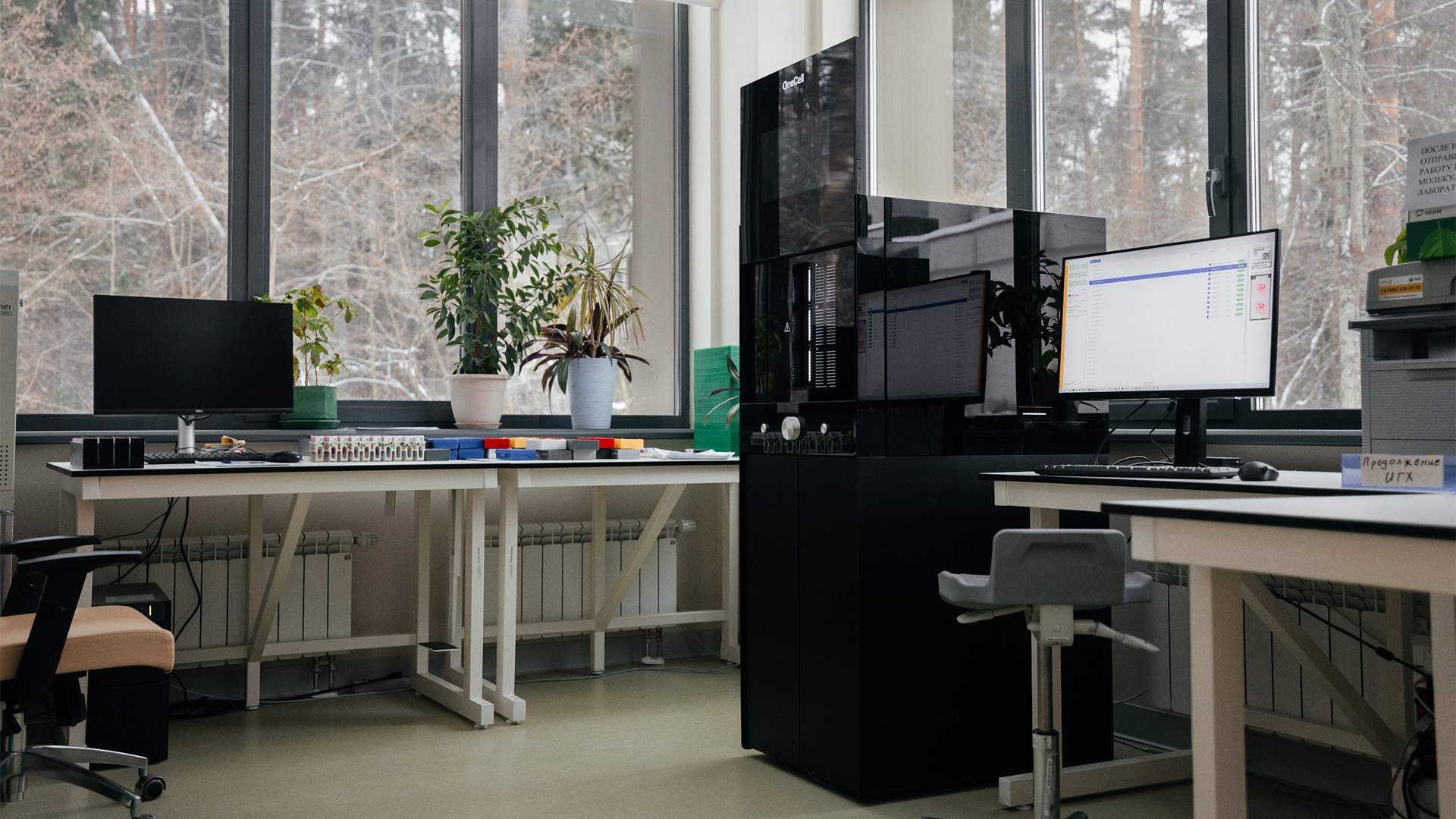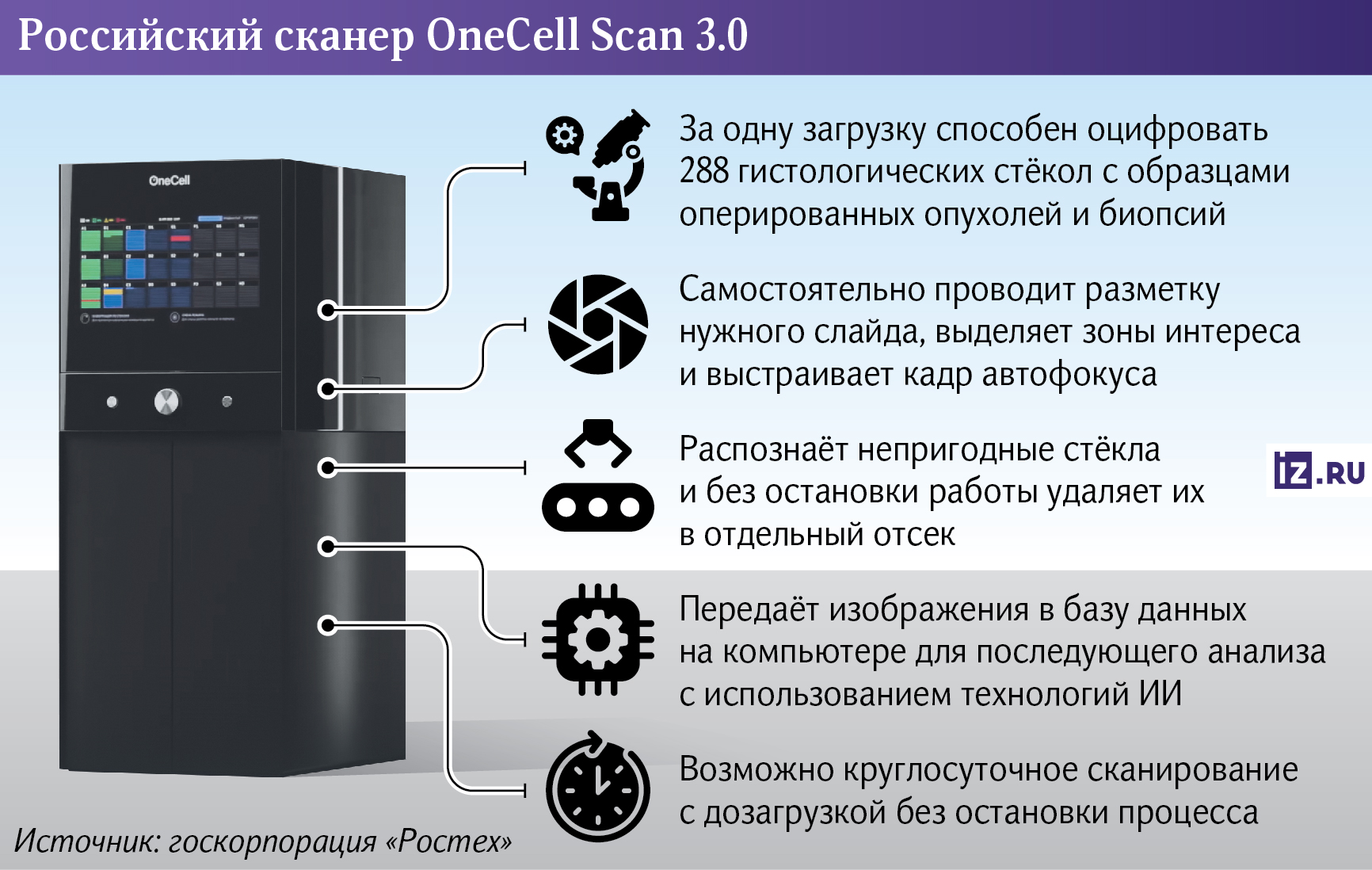Instrument Citadel: the first Russian oncoscanner went into serial production

A domestic digital scanner for oncodiagnosis has begun mass production in Russia, the Rostec state Corporation told Izvestia. Previously, such high—tech devices were purchased abroad - there were Russian developments, but they did not reach serial production. The OneCell Scan 3.0 device digitizes histological glasses, marks the frame, highlights areas that require special attention, and transmits data to a computer database. Next, the AI allows you to establish an accurate diagnosis. The experts interviewed called the appearance of a domestic device and its introduction into production a great help for doctors — such devices are necessary in every morphological laboratory.
The first domestic oncoscanner
The first domestic digital scanner for accurate detection of cancer cells, the OneCell Scan 3.0 device, has been put into mass production in Russia, the Rostec state Corporation told Izvestia. This high—tech device is designed to digitalize histological and cytological micro-preparations - glasses with samples of operated tumors and biopsies in one download. The complex is manufactured by the Vansell company, the subsidiary holding of Rostec AIS owns 25% of this company.
In automatic mode, the scanner can digitize 288 glasses each.
"OneCell 3.0 is able to accurately identify cancer cells. This will help doctors to make an accurate diagnosis," the state corporation said. "The creation of a high—tech device for scanning micro—preparations is a big step forward for Russian medicine, which is moving towards digital diagnostic formats."
The degree of localization of the scanner is 82.6%. A significant proportion of its components and software are of domestic production.
The demand of the Russian market for micro-drug scanners is estimated at 1 thousand devices. It is planned to produce 50 complexes this year.
"In the future, we plan to produce up to 200 units per year. If more is needed, we will produce more," the Group said. —Rostec's facilities make it possible to completely eliminate the need and provide medical facilities with the OneCell complex, which includes both a scanner and a digital telemedicine platform for pathology laboratories."
For the first time in public, the OneCell Scan 3.0 scanner was demonstrated on May 14 at the National Health — the Basis of Russia's Prosperity forum.
How the oncoscanner works
The device is used in medical laboratories and is capable of providing round-the-clock scanning with the possibility of reloading without stopping the process, Rostec explained.
"The scanner independently marks the desired slide, highlights the areas of interest and builds an autofocus frame. After that, the slide with the image will be transferred to a database on a computer for subsequent analysis using AI technologies," the state corporation said.
The artificial intelligence integrated into the device helps to ensure the fastest and most accurate diagnosis of oncological diseases, they explained.
"The scanner solves the problem of early diagnosis of oncological diseases. Therefore, the device will primarily be supplied to state cancer centers," Rostec said.
In addition, negotiations are already underway on the supply of equipment to clinical and diagnostic laboratories.
"This will ensure a wide coverage and a high level of reliability of the results due to domestic modern equipment," the state corporation said.
The device surpasses its imported counterparts in a number of indicators.
"For example, OneCell 3.0 detects scanning zones in automatic mode, recognizes unusable glasses and removes them into a separate compartment without stopping work," Rostec said. — In 2025, the product was awarded the international RedDot Awards 2025 for excellent ergonomics. None of our competitors in the world has such an award."

This type of device is necessary for accurate pathomorphological diagnosis of malignant neoplasms, therefore, the ability to digitize glasses greatly facilitates it and allows the use of telemedicine technologies, explained Maxim Kotov, market expert at NTI Helsnet, oncologist at the N.N. Petrov National Research Medical Center of Oncology.
"This is especially important for regions that do not have qualified oncological pathologists," he said. — The promising characteristics of this device are the speed of operation, the possibility of automatic glass rejection. Using AI allows you to draw the pathologist's attention to a specific area of the tumor and its characteristics, which helps to avoid mistakes and speeds up the diagnosis.
Telemedicine technologies
The OneCell platform, which together with the scanner forms a telemedicine complex, can carry out a full cycle of digital processing: from uploading macro and micrographs to drawing up a conclusion. AI algorithms are also integrated into the product, which automatically control the quality and various image formats and control the entire system.
The OneCell software platform is included in the register of domestic software and is registered as a medical device with proven clinical efficacy and safety. Currently, more than 20% of Russian pathologists use the OneCell platform in their daily practice. In particular, the Moscow Centers for Pathoanatomic Diagnostics and the Moscow State Medical University work with her. Sechenov, Russian Scientific Center of Surgery named after Academician B.V. Petrovsky, as well as in the laboratories of Hemotest, De Genie and Citylab. The platform is also being implemented in Russian regions. The total number of diagnoses in the system exceeded one million.
"Creating an integrated approach to digitization and management of histological examinations will make it possible to make diagnoses, conduct telemedicine and consultations, and intelligently distribute digital cases among doctors without paper referrals," Rostec noted.
Experts interviewed by Izvestia called the development promising. Thus, Alexey Sidorin, head of the pathology department at Medscan Hadassah, noted that the complex solves several tasks at once, namely, the platform occupies a leading place in the work of specialists.
"The combination of high—tech equipment, artificial intelligence, ease of use, and government support makes this development one of the most significant steps in the digital transformation of Russian medicine," he said. — The accuracy and speed of diagnostics are improving, the burden on doctors is reduced, and the technological sovereignty of the country is ensured.
Oncologist surgeon, Doctor of Medical Sciences, Academician of the Russian Academy of Sciences Igor Reshetov stated that attempts to automate and standardize the processes of histological analyses are not a new topic, but they are very relevant.
"There was a lot of groundwork in our country for research and development, but they were not mass—produced," he said. — At the same time, every morphological laboratory should have such a device.
The expert recalled that such installations were bought abroad, in Europe and the USA, and more recently in China.
As noted in Rostec, the domestic device is 10-15% cheaper than its foreign counterparts.
Переведено сервисом «Яндекс Переводчик»








